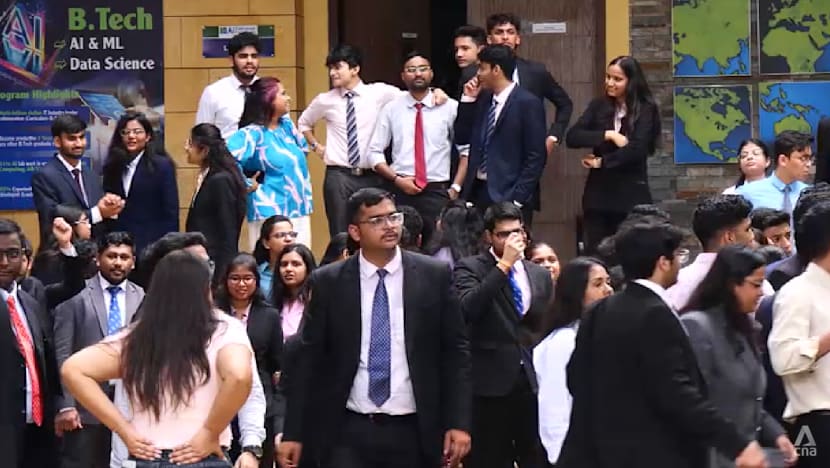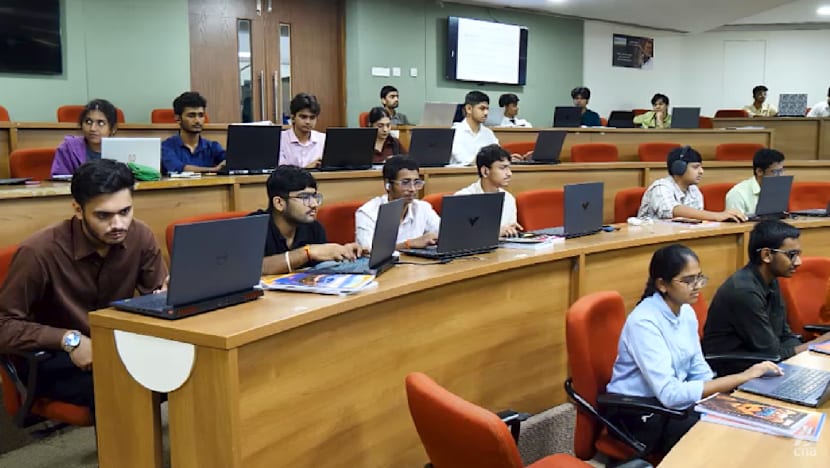China’s new K visa could attract Indian tech talent amid tightening of US immigration
The move reflects Beijing’s effort to attract foreign investment and talent amid its rivalry with Washington.

At the Universal AI University in India’s Karjat city, about 70km from Mumbai, students are preparing to become the coders and tech leaders of tomorrow.

This audio is generated by an AI tool.
MUMBAI: As India’s young tech graduates seek opportunities abroad, a somewhat unexpected destination is starting to catch their attention – China.
China’s new K visa, launched this month, could pave the way for a wave of Indian professionals at a time when traditional pathways to the United States have become more restrictive.
Aimed at young foreign graduates in science, technology, engineering, and mathematics (STEM), the visa allows entry, residence and employment without the need of first clinching a job offer.
The rollout follows a thaw in ties between New Delhi and Beijing, following the deadly 2020 border clashes along a disputed Himalayan frontier.
Observers said the K visa has rekindled hopes of greater collaboration between the world’s two most populous nations, and could encourage India’s skilled workforce to look eastward for new opportunities.
CHINA’S TECH PUSH
Announced in August, the K visa is part of Beijing’s broader effort to signal openness to foreign investment and global talent.
At the Universal AI University in India’s Karjat city, about 70km from Mumbai, students are preparing to become the coders and tech leaders of tomorrow.
They represent just a fraction of the 2.5 million STEM graduates India produces every year – a vast talent pool that economies worldwide are eager to tap.
Some students told CNA they are intrigued by China’s rapid advances in technology, especially in artificial intelligence.
“China is way ahead in technology,” said one student. “They are advancing day-by-day in AI, so it will be a great opportunity for us to learn.”
Another student said: “If I get a chance I’ll of course go to China and I’ll learn something, and I’ll come back to India.”
However, Universal AI University's founder and chancellor Tarun Anand, who has worked extensively in China, said it is still too soon to make firm plans.
“It's a first move of opening up and making it comparable to some extent and reducing the burden of employer visas, employers guaranteeing jobs to students,” he added.
“So in a sense, it is interesting, but it's the first step that China has made. It needs to create an ecosystem to attract international students, and we're miles away from that.”
The K visa is also viewed as part of Beijing’s strategy to strengthen its position in the global talent race, particularly against Washington.
Yet, the language barrier remains a major challenge – unlike the US, which has long been the preferred destination for Indian tech professionals, said observers.

GLOBAL COMPETITION FOR STEM TALENT
However, analysts believe China is keen to capitalise on changing dynamics.
Last month, US President Donald Trump imposed a US$100,000 fee for its popular H-1B visa, making it significantly more expensive for American firms to hire Indian workers.
The H-1B visa allows American firms to hire skilled workers essential to filling talent gaps and keeping them competitive.
“With the recent changes in visa and immigration rules in the US, the K visa opens up a new pathway for these students to explore opportunities in a vibrant and dynamic market like China,” said Vikram Ahuja, co-founder of ANSR, which helps organisations build and scale global teams.
“Like many other things that are happening around the world today, global opportunities are becoming more and more available to graduating students.”
India-based visa processing firm StampMyVisa said it has already noticed growing interest, with co-founder Rahul Borude indicating that momentum is building as it receives more enquiries.
But it is still awaiting exact guidelines before it can open up K visa applications.
China is not alone in courting global tech talent.
Countries such as New Zealand, Germany and South Korea are also taking steps to make it easier for skilled professionals from India to move and work there.
These options appeal to graduates less eager to move to China, which some argue lacks the same level of freedom and diversity found in countries like the US and the United Kingdom.
At the same time, China faces its own internal challenge – it is already producing a large number of its own STEM graduates competing for limited high-tech jobs.
“Chinese talent needs jobs. Indian talent needs jobs,” said Universal AI University’s Anand.
“It's going to be an interesting move to open the door. But I don't see it going to be a tsunami of movement in that direction yet.”
















